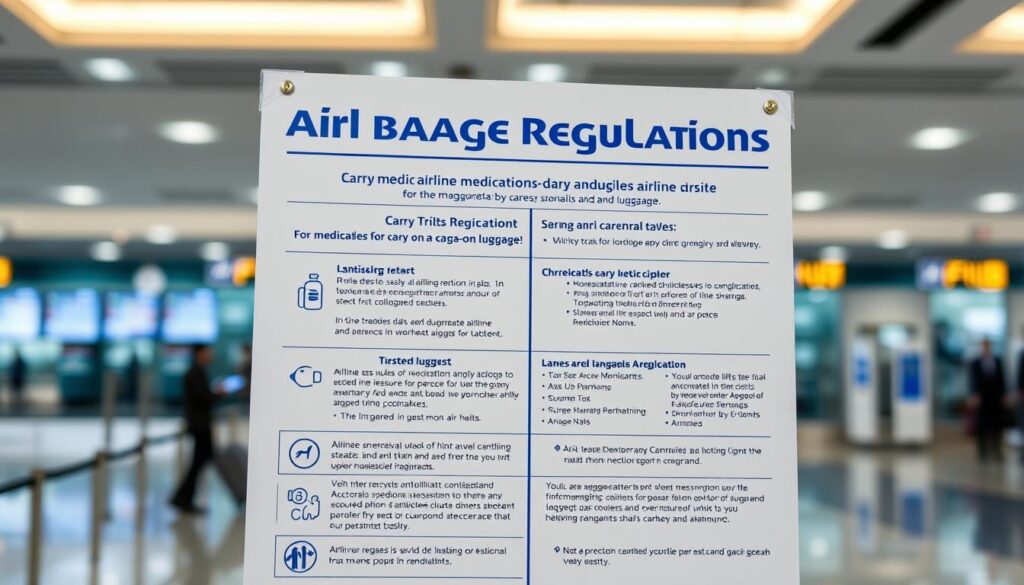Anúncios
Ever thought about being ready for medical emergencies while traveling, especially with a baby? Travel health can change quickly. It’s key to be ready for health issues and have a mini pharmacy in your carry-on. You’ll learn how to make a personal healthcare oasis that meets your needs and keeps you calm on trips.
Understanding the Importance of Being Prepared for Medical Emergencies
Traveling comes with risks, making it key to know about medical emergencies. Being away from home increases the chance of facing these situations. Knowing this helps in being ready and safe while traveling.
Anúncios
Real-life stories show how unexpected medical issues can happen while traveling. Whether it’s a sudden illness or an injury, these can upset plans and cause stress. Millions of travelers get medical help during their trips, showing the importance of being alert and prepared.
Being prepared is more than just packing the right things; it brings peace of mind. When families are ready for medical emergencies, they can enjoy their trip more. A few important steps can greatly improve any travel experience.
Identifying Common Medical Emergencies While Traveling
Traveling is exciting, but it can also lead to medical emergencies. Knowing about these issues helps you act fast and right. Common problems include cuts, bruises, allergies, dehydration, and stomach issues.
Anúncios
Cuts and bruises happen by accident. Clean the wound and use a sterile bandage to avoid infection. Allergies can start from food or the environment. Spotting symptoms like hives or trouble breathing is key. Keep an antihistamine handy for quick relief.
Dehydration comes from too much heat or exercise. Look for signs like dizziness, dry mouth, and feeling tired. Drinking lots of water is crucial. Stomach problems like diarrhea or upset stomach are common too. Watch what you eat and stay clean to reduce risks. Having over-the-counter meds ready helps you handle these emergencies quickly.
Traveling with Prescription Medications: What You Need to Know
Traveling with prescriptions needs careful planning. You must follow medication rules for a smooth air travel experience. Prescription medications might get extra checks from security, so being ready is key.
The Transportation Security Administration (TSA) lets you carry solid medications without limit. They must be screened. Keeping them in their original packaging helps authorities quickly check them. For liquid medications, TSA allows bigger containers if you tell security at the checkpoint.
Getting a doctor’s note is a good idea for international trips. It explains why you need certain medications. This can help you get through customs easier. Remember, each country has its own rules, so check them before you go.
Knowing the rules for medications at home and abroad makes traveling easier. It lets you enjoy your trip more, without worrying about your medications.
Pro Tips for Packing Your Medications in Carry-On Luggage
Packing your medications wisely can make your trip better. Keeping them in your carry-on luggage lowers the chance of losing them. It also gives you peace of mind when moving through airports.
Using clear, resealable bags makes it easier to get to your meds at security. It can also make the process faster. Having a list of your medications, including how much and why you take it, is very helpful.
It’s smart to have emergency meds in your carry-on. This means you’re ready for any situation. Knowing carry-on luggage tips can make your trip smoother.
Organizing your meds by your travel plan is a good idea. For long trips, sort them by day or activity. This helps you not miss any doses. Always follow rules for prescription meds, like how much you can carry and labeling.
Using these tips can really help. It lets you enjoy your trip more, without worrying about your health supplies.
Creating a Mini Pharmacy in Carry-On Luggage for Baby
Traveling with a baby can be tough, especially when it comes to health and safety. Having a mini pharmacy in your carry-on luggage is key. It makes sure you’re prepared for any medical needs on your trip. Packing the right baby medications shows you care about your child’s safety and well-being.
Essential Medications for Babies
Setting up a mini pharmacy for your baby can give you peace of mind while traveling. Here are the must-have baby medications for your travel kit:
- Children’s fever reducers like acetaminophen or ibuprofen
- Antihistamines for allergic reactions
- Ointments for diaper rash or minor skin irritations
- Antifungal creams for skin infections
- Cold medications suitable for infants
It’s important to know the right doses and possible side effects of these medications. Having them on hand can help a lot if your baby gets sick while you’re away.
Considerations for Baby-Safe Products
Choosing safe products for your mini pharmacy is essential. Look for items that are:
- Organic and natural ingredients when possible
- Hypoallergenic to reduce the risk of allergic reactions
- Clearly labeled with expiration dates and storage instructions
These steps not only keep your baby safe but also make your trip more enjoyable. Being careful about the products you choose is crucial for your baby’s health.
Rules and Regulations for Carrying Medications on Flights
Traveling with medications can be tricky because of many rules. It’s important to know these to avoid any problems on your trip.
The Transportation Security Administration (TSA) lets you carry solid medications without limit. For liquids, you can bring up to 3.4 ounces per container. All liquid meds must go through security checks. It’s best to keep them separate from other luggage for faster screening.
Flights to other countries have their own rules for medications. Some places have strict laws that might not allow certain drugs, even if they’re okay in the U.S. It’s smart to check the laws of your destination to avoid trouble at customs.
Also, check your airline’s rules for carrying medications. Some airlines might have extra rules. It’s a good idea to have your prescriptions ready, especially for controlled substances. A doctor’s note can help you get through security faster.
| Type of Medication | Allowed Quantity | Additional Notes |
|---|---|---|
| Solid Medications | Unlimited | No special restrictions |
| Liquid Medications | Up to 3.4 ounces | Subject to screening |
| International Regulations | Varies by country | Check destination laws |
Knowing the rules for medications, travel laws, and airline rules makes your trip better. It ensures you have the medical supplies you need without any issues.

How to Organize Your Medications Effectively
Keeping your medications organized is key for smooth travel. It makes sure you can find your meds when you need them. Travel-friendly pill organizers make this easy, helping you manage your meds on the move.
Using Travel-Friendly Pill Organizers
Travel pill organizers are a smart choice for those with many meds. They come in sizes like small cases and big multi-compartment ones. Pick one that fits your needs, like how many doses you have.
Choose an organizer with clear spots for each med. This makes it easy to find and take your meds, even when you’re in a rush.
Labeling and Documenting Your Medications
It’s important to label your meds clearly. Each label should show the med’s name, how much to take, and when to take it. This is crucial for kids, so they know what to take.
Also, write down all your meds, including prescriptions and over-the-counter ones. Use your phone or apps to keep this list handy. It’s useful at security checks or when talking to doctors while traveling.
Liquid Medications and Security Screening Guidelines
Traveling with liquid medications can make airport security checks harder. The TSA lets you carry more than 3.4 ounces of liquids if they’re for medical use. You must tell security about these items right away.
Make sure your liquid medications are in their original containers. This helps prove they’re for medical use. Knowing the TSA rules well can help you avoid delays at security.
Keep your liquid medications in a separate bag when going through security. This makes it easier for security to check them. Remember, TSA rules are made to keep everyone safe and make travel easier.
What to Do If You Encounter Issues at the Security Checkpoint
Running into problems at the security checkpoint can be scary, especially if you’re carrying medications. Knowing the TSA rules can make dealing with travel emergencies easier. If your meds are checked, stay calm and explain the situation.
Tell the TSA agent about your medications and why you need them. It’s a good idea to have a doctor’s note or prescription ready. If they ask to see your meds, help them by making them easy to check.
If there’s a problem, try to gather more information to help solve it. Being ready can make things go smoother. If your flight is delayed, have a plan for keeping your meds safe and ready.
| Situation | Recommended Action |
|---|---|
| Medication questioned | Explain and provide documentation |
| Request for visual inspection | Comply and assist TSA agents |
| Medication spills or leaks | Inform officials and provide a backup |
| Travel emergency due to delays | Have a strategy for medication management |

Understanding State and International Regulations for Medications
Traveling with medications can be tricky due to state and international rules. Each place has its own rules for bringing in medicines. It’s important to research the laws of your destination before you go.
Make sure your prescription medicines are in their original bottles. They should have your name and the prescription details on them. This can help you get through customs easier. Sometimes, customs might ask for your prescription to check if you’re allowed to have the medicine.
Some medicines are okay in one country but not in another. It’s key to check if your medicines are allowed where you’re going. Some medicines in the U.S. might be banned in other places.
Talking to your doctor before your trip is a good idea. They can help make sure your medicines are okay to bring. They’ll check if they follow federal, state, and international laws. This helps make sure you can travel safely with your medicines.
Building Your Mini Pharmacy: Essential Items to Include
Having a mini pharmacy in your carry-on bag is key for travel health. It helps you deal with minor injuries and common ailments. Here’s what you need in your travel health kit, like first aid supplies and OTC medications.
First Aid Supplies for Minor Injuries
A good travel first aid kit is crucial for minor injuries. You should include:
- Adhesive bandages: Great for small cuts and scrapes.
- Antiseptic wipes: Important for cleaning wounds to avoid infections.
- Gauze pads: Needed for covering bigger wounds.
- Antibiotic ointment: Keeps cuts and scrapes from getting infected.
- Elastic bandages: Helps with sprains or strains by providing compression.
Knowing how to use these items boosts your confidence in handling minor injuries while traveling.
Over-the-Counter Medications for Common Ailments
Having the right OTC medications in your mini pharmacy is very helpful. You should include:
- Antihistamines: Good for allergies and hay fever symptoms.
- Pain relievers: Like ibuprofen or acetaminophen for headaches or muscle aches.
- Anti-diarrheal medications: Important for unexpected stomach issues.
- Cold and cough remedies: Helps with common cold symptoms during your trip.
Knowing the right doses and who can take each item is key. It ensures you get relief from health issues while traveling.
Managing Temperature-Sensitive Medications During Travel
Traveling with temperature-sensitive medications like insulin is tricky. It’s important to know how to keep them at the right temperature. If the temperature changes too much, it can affect how well the medication works.
Use insulated bags made for medical transport to keep your meds safe. Ice packs or gel packs can also help keep things cool. But, make sure these items are okay to use during travel to avoid security issues.
Here are some tips for managing temperature-sensitive medications while traveling:
- Keep medications in their original packaging, which often provides vital information for proper storage.
- Use a thermometer to regularly check temperatures within your carrying case.
- Avoid exposing medications to extreme heat or cold by keeping them with you, rather than in checked luggage.
Parents need to be extra careful with kids’ medications. Proper storage is key to keeping them effective. By following these tips, you can safely transport your medications and keep your family healthy on the go.
The Role of a Doctor’s Note When Traveling with Medications
Getting a doctor’s note is key when you travel with medications. It’s especially important for those who need prescribed treatments. This note should list your medical conditions and the medications you take. It also needs the doctor’s contact info to make it official.
A doctor’s note makes talking to customs and security easier. It helps show that your medicines are real and needed. This makes going through airports or borders less of a hassle.
When you make this document, make sure it’s clear and complete. It should say the name of the medicine, how much to take, and why you’re taking it. This helps a lot when you’re going through checks at airports or borders.
Tips for Traveling with Medication and Your Child
Traveling with kids can be tough, especially when you have to manage their medicine. Talk to your kids about why they need their medicine. This helps them understand and feel responsible.
Before you leave, collect all your child’s medicines. Pack them in your carry-on so you can get to them easily. Make a list of medicines, how much to take, and when. This list is very helpful if someone else needs to help your child.
Talk to your kids about their health needs while traveling. Explain how to handle small health problems. This makes them feel more in control and safe, but still lets you watch over them.
Make a plan for remembering to take medicine while you’re away. Use apps or alarms to keep up with the schedule. This way, you can keep your child’s health a priority and have a fun trip together.
Conclusion
Being ready for medical emergencies while traveling is key for family safety, especially with babies. A well-organized mini pharmacy in your carry-on can help with common health issues. It’s important to have the right medications for unexpected situations.
Parents should use the tips from this guide to plan their travel medicine kits. With the right preparation, you can enjoy your travels safely and happily. Also, knowing about health advisories in your destinations is crucial for your family’s safety.
By following these strategies, you’ll be more ready for travel and feel more at ease. This way, you can focus on making great memories with your family. Travel safety and preparedness are vital for handling any medical emergencies that might come up.




